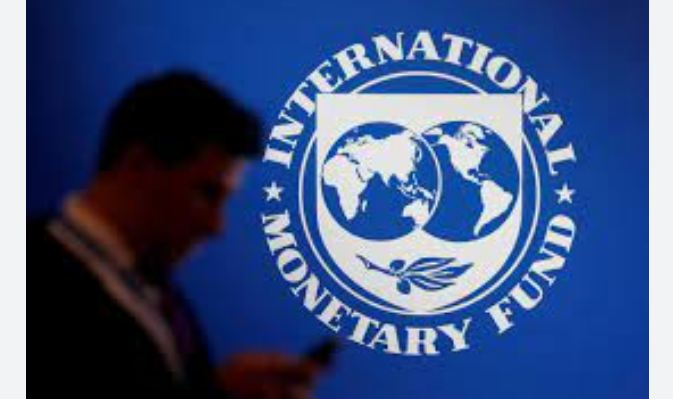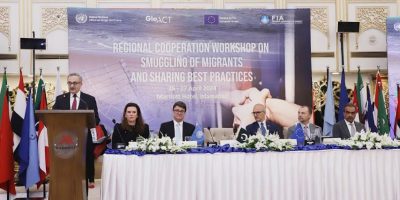IMF Chief optimistic about Pakistan loan deal, says country’s debt sustainable
 –Seeks financial assurances from Pakistan’s allies for bailout deal completion
–Says Pakistan has yet to reach bankruptcy and better not
WASHINGTON, Managing Director of the International Monetary Fund (IMF) Kristalina Georgieva has expressed the hope that Pakistan will successfully complete the current loan programme and not face the same situation as Sri Lanka and Ghana, but Pakistan is at risk of bankruptcy.
She says that Pakistan has not got there though and it is better not to
get there.
Delivering her speech at the annual meeting of the International
Monetary Fund (IMF) and the World Bank in Washington, the IMF chief said
there is no doubt that Pakistan is facing climate challenges, but there
is hope from the steps taken by the Pakistani authorities. will
successfully complete this programme.
Kristelna Georgieva said at this time they were talking about providing
financial guarantees of Pakistan. “To be at the forefront of change, one
must think about the future sustainability of agriculture in Pakistan.”
Kristelna Georgieva said that they are working hard together with the
Pakistani authorities, and the country should create such a political
framework that avoids economic risks. “We want Pakistan to move towards
sustainable economic development. We want assurance of financial
support.”
Asked about the risk of Pakistan failing, the IMF chief replied that
Pakistan has not yet reached that point and it is better not to, to
avoid the consequences of a growing global trade divide for all
countries to prevent a second Cold War. “I am one of those people who
know what the consequences of the Cold War were, the Cold War was a
great loss of competence and partnership in the world, institutions such
as the World Bank, the IMF were important in preventing the world from
dividing into different blocs. It has character.”
The IMF managing director said that policymakers should play an
important role in protecting the interests of their citizens. “If we do
not show realism, people everywhere will be in a bad situation. There is
a possibility of a 7% drop, the distribution of global trade has
increased due to Brexit, the US trade war, China and the Ukraine
conflict.”
Since early February, Pakistan has been negotiating with the IMF to
revive the $7 billon bailout programme to secure $1.1 billion tranche.
Pakistan hopes that the deal will also unlock funds from other donors
waiting for IMF’s endorsement.
Later at a news briefing in Washington, Kristalina Georgieva said “My
hope is that with the goodwill of everyone, with the implementation of
what has been already agreed by the Pakistani authorities, we can
complete our current programme successfully.”
She pointed out that the Fund’s projected global 2.8 percent in 2023 was
“the weakest medium-term forecast in decades”. The growth will remain
weak, at around 3pc, over the next five years, she added.
“Underlying inflation remains stubbornly high, geo-economic
fragmentation affects trade and capital flows, and downsides risks have
increased,” she warned. “Fighting inflation and safeguarding financial
stability have become more complex with the recent banking sector
pressures.”
Responding to a question about the impact of climate change on
Pakistan’s economy, Ms Georgieva said in 2011 she had the opportunity to
see what climate change meant for the people of Pakistan. “And I know
that (last summer’s) flood is much more dramatic than the one I
witnessed,” she added.
“No question Pakistan will continue to be on the frontline of the
climate crisis. And that means that communities also think about the
future of agriculture in a more climate sustainable manner,” she said.
Responding to a question about IMF-Pakistan talks for the revival of the
2109 loan package, Ms Georgieva said: “We have been working very hard
with the authorities in Pakistan within the context of our current
programme to make sure that Pakistan has the policy framework that makes
it possible to avoid what you are talking about.”
The reporter who asked the question had hinted at the possibility of
Pakistan’s burgeoning debt becoming unsustainable. But Ms Georgieva said
the purpose of the IMF-Pakistan talks was to avoid getting to a point
where the country’s debt may become unsustainable. “We are not there yet
and it’s better not to get there,” she said.
The IMF and Pakistani officials, she said, were also discussing how to
support Pakistan “in terms of providing financial assurances so we can
complete the programme”.
She also said that the IMF is in discussions with friendly countries of
Pakistan to provide financial assurances to complete the programme,
expressing hope that with everyone’s goodwill and the implementation of
what has been agreed upon by Pakistani authorities, the current
programme can be completed successfully.
–Seeks financial assurances from Pakistan’s allies for bailout deal completion
–Says Pakistan has yet to reach bankruptcy and better not
WASHINGTON, Managing Director of the International Monetary Fund (IMF) Kristalina Georgieva has expressed the hope that Pakistan will successfully complete the current loan programme and not face the same situation as Sri Lanka and Ghana, but Pakistan is at risk of bankruptcy.
She says that Pakistan has not got there though and it is better not to
get there.
Delivering her speech at the annual meeting of the International
Monetary Fund (IMF) and the World Bank in Washington, the IMF chief said
there is no doubt that Pakistan is facing climate challenges, but there
is hope from the steps taken by the Pakistani authorities. will
successfully complete this programme.
Kristelna Georgieva said at this time they were talking about providing
financial guarantees of Pakistan. “To be at the forefront of change, one
must think about the future sustainability of agriculture in Pakistan.”
Kristelna Georgieva said that they are working hard together with the
Pakistani authorities, and the country should create such a political
framework that avoids economic risks. “We want Pakistan to move towards
sustainable economic development. We want assurance of financial
support.”
Asked about the risk of Pakistan failing, the IMF chief replied that
Pakistan has not yet reached that point and it is better not to, to
avoid the consequences of a growing global trade divide for all
countries to prevent a second Cold War. “I am one of those people who
know what the consequences of the Cold War were, the Cold War was a
great loss of competence and partnership in the world, institutions such
as the World Bank, the IMF were important in preventing the world from
dividing into different blocs. It has character.”
The IMF managing director said that policymakers should play an
important role in protecting the interests of their citizens. “If we do
not show realism, people everywhere will be in a bad situation. There is
a possibility of a 7% drop, the distribution of global trade has
increased due to Brexit, the US trade war, China and the Ukraine
conflict.”
Since early February, Pakistan has been negotiating with the IMF to
revive the $7 billon bailout programme to secure $1.1 billion tranche.
Pakistan hopes that the deal will also unlock funds from other donors
waiting for IMF’s endorsement.
Later at a news briefing in Washington, Kristalina Georgieva said “My
hope is that with the goodwill of everyone, with the implementation of
what has been already agreed by the Pakistani authorities, we can
complete our current programme successfully.”
She pointed out that the Fund’s projected global 2.8 percent in 2023 was
“the weakest medium-term forecast in decades”. The growth will remain
weak, at around 3pc, over the next five years, she added.
“Underlying inflation remains stubbornly high, geo-economic
fragmentation affects trade and capital flows, and downsides risks have
increased,” she warned. “Fighting inflation and safeguarding financial
stability have become more complex with the recent banking sector
pressures.”
Responding to a question about the impact of climate change on
Pakistan’s economy, Ms Georgieva said in 2011 she had the opportunity to
see what climate change meant for the people of Pakistan. “And I know
that (last summer’s) flood is much more dramatic than the one I
witnessed,” she added.
“No question Pakistan will continue to be on the frontline of the
climate crisis. And that means that communities also think about the
future of agriculture in a more climate sustainable manner,” she said.
Responding to a question about IMF-Pakistan talks for the revival of the
2109 loan package, Ms Georgieva said: “We have been working very hard
with the authorities in Pakistan within the context of our current
programme to make sure that Pakistan has the policy framework that makes
it possible to avoid what you are talking about.”
The reporter who asked the question had hinted at the possibility of
Pakistan’s burgeoning debt becoming unsustainable. But Ms Georgieva said
the purpose of the IMF-Pakistan talks was to avoid getting to a point
where the country’s debt may become unsustainable. “We are not there yet
and it’s better not to get there,” she said.
The IMF and Pakistani officials, she said, were also discussing how to
support Pakistan “in terms of providing financial assurances so we can
complete the programme”.
She also said that the IMF is in discussions with friendly countries of
Pakistan to provide financial assurances to complete the programme,
expressing hope that with everyone’s goodwill and the implementation of
what has been agreed upon by Pakistani authorities, the current
programme can be completed successfully.
(Next News) SC directs SBP to release funds for elections in Punjab »
Related News

UNODC, Pakistan join hands to combat smuggling of migrants
ISLAMABAD, APR 26 /DNA/ – The Federal Investigation Agency (FIA) and the Ministry of ForeignRead More

Complete independence impossible without economic stability: COAS
RAWALPINDI, APR 26: Chief of Army Staff (COAS) General Asim Munir on Friday said thatRead More


Comments are Closed